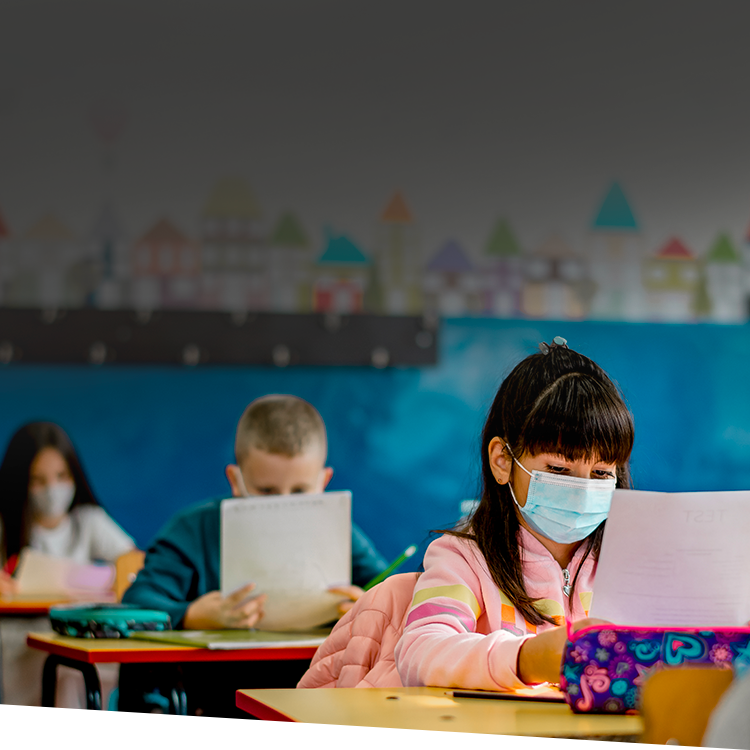As education thought leaders, we have observed with interest recent debates about how to “catch kids up” from their “academic learning loss” after the COVID-19 pandemic ends. We certainly agree students have missed out on powerful and lasting learning from hands-on social activities that have been drastically modified or canceled altogether over the last year.
We, too, lament the things so many kids have missed—a year of school plays, collaborative projects, field trips, clubs, and athletics. These experiences are often the reasons students love to come to school, and the lessons they take away are what they remember most years later.
Yet the focus of this debate is on a perceived loss in academic development. Will students be behind in reading and math? Did they learn enough history? Will they be “on grade-level” in September? Do we need to catch them up with summer classes?
We think these questions, and the debate, are misguided.
Private schools are free to choose what and how they teach, and, importantly, how they assess what students know and can do. It is true, of course, that schools maintain similar curricula within the so-called “canon” of academic disciplines—English, history, math, science, etc. However, for the most part, private schools have been able to resist movements toward arbitrary standards set by state or national organizations, and the standardized testing that follows.
Instead, private schools have chosen to emphasize more profound student learning goals in their missions and marketing, such as emotional intelligence, lifelong learning, global citizenship, creative thinking, resilience, curiosity, the ability to collaborate and problem-solve, empathy, and a host of other qualities.
We believe these more profound learning goals are what schools should examine in order to determine how to work with students after the pandemic. A recent blog post by Ira David Socol [link to Ira’s post], a colleague who works with public schools, frames a better set of questions to ask.
“What choices will our students have when they are 30? What was important for kids to take away from their schooling? Who do you want your children to be? The question to ask is whether our kids will be equipped to make decisions that matter when they are adults. “Kids are not falling behind. Kids are where they are. Kids are not ‘losing learning,’ nothing deeply learned is ever really lost. Saying that they are ‘losing’ or ‘behind’ is simply accepting our measurement of kids against a mythological norm.” [emphasis added]
Student-centered private schools take pride in providing supportive communities in which students can grow to their fullest potential.
Instead of extra academic work to make up for lost time during the pandemic, students need opportunities to build personal competencies that will serve them well over time.
We don’t know what the world will be like when today’s students are 30, but as Ira says, leaders must consider important questions that will prepare our children for their future.
Will students be able to:
- Choose where to live?
- Choose their vocation?
- Choose what kind of healthy, happy family to be part of?
- Determine how to pursue further education via a “school” or other paths?
- Choose how to take in information and process it so they can tell truth from lies and information of value from trivia?
- Understand how to be heard in their workplace, community, state, and nation?
- Pursue effective, accessible ways to stay healthy?
If leaders are guided by questions like these, the answers will provide a framework for working with students moving forward.
Measuring What Is Valuable
Schools report grades and credits to parents and next-level institutions, largely based on student performance in the academic disciplines. Schools should assess and report more about how students progress toward the profound learning goals that matter most. The way schools assess students tells them what is valued.
We encourage schools to consider their assessment strategies more broadly.
- What characteristics do you value most?
- How can these be demonstrated by your students?
- How do assessment decisions in the academic disciplines impact how you teach?
- Do you agree that preparing students for the next 30 years is more important than preparing them for the next level of education? If so, what do you need to change in the coming year?

Ask questions related to this Source article or other topics you've encountered lately.
Visit our NEW Community and start posting.
We agree with Ira that when leaders teach and assess in “relevant and authentic ways,” students learn reading, algebra, and poetry. Students will develop algebraic thinking when they realize they need it to measure their rooms or, as Ira shared in his own experience, he understood algebra when he needed it to “size a structural beam.”
When curriculum and assessment are fully engaged with the lives and passions of children, kids move toward the learning they will need in their lives.
We encourage you to read and ponder Ira’s post as you plan for the return on-campus learning. It would be a terrible disservice to our students if we make the return to school a forced march through “important academic content” in a misguided attempt to “catch them up"—especially when what they need is time together with their peers and trusted adults to continue growing toward the learning goals your school asserts you value most. We encourage schools to recognize that students do not need to be “fixed” after a “broken” year of schooling.





